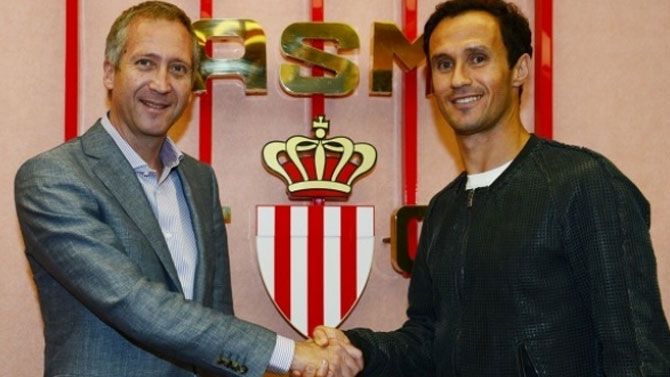
AS Monaco: The Red and White having to fight the contempt in order to play beautiful

AS Monaco mean business. Having just secured their return to Ligue 1 after a two-year absence, they have immediately launched their bid to drown out the competition by spending big courtesy of their oligarch owner, Russian Dmitry Rybovlev.
Paris St Germain and their Qatari billionaires marched to the title last season and Monaco have identified the only way of beating them is to join them in the culture of lavish spending.
James Rodriguez and Joao Moutinho have joined from Porto for £70 million combined; Ricardo Carvalho is due to join on a one-year deal and Radamel Falcao, Athletico Madrid’s free-scoring Colombian, is due to be next for a sum of £50 million. Barcelona goalkeeper Victor Valdes and Brazilian winger Hulk have also been linked as Monaco’s intention to build their own generation of Galacticos seems to be relentless.
“We want to build a beautiful team who play beautiful football” said Rybovlev.
Just where they will be doing that next year remains to be seen however, with the Ligue De Professionelle de Football threatening to ban the club from taking their place in Ligue 1 in August unless they move their offices from the small principality which remains a tax-haven.
Their base, which has remained free of tax since 1963, gives Monaco an advantage over the rest of the league, including PSG, and the LFP have vowed to exclude them from competition if they fail to register with the country’s fiscal authorities. The LFP have ruled that all clubs must comply with that legislation by 2014.
It is an exemption that will only be of benefit to the foreign players as indigenous players, even though they will enjoy a 20% reduction in National Insurance, will still have to pay a full-rate of tax. This, rather-worryingly, breeds a counter-intuitive culture where the incentive is to buy overseas talent, rather than home-grown.
Carvalho, Moutinho, Rodriguez and co. will all earn tax-free salaries and in Monaco’s case, it is the huge amounts of money on offer and not the normal attraction of Champions League football, that seems to be the biggest motive behind players choosing to move to the club. Falcao for instance, will earn a reported 14 million euros over the course of his ten year deal and it is that mammoth spending power, boosted by a loophole in the French tax system, that the rest of France are simply unable to compete with. To compare, to pay Zlatan Ibrahimovic the same take-home salary of €30 million he enjoys at PSG, Monaco would have to fork out just €9 million.
The French Football Federation have intervened in the dispute between Monaco and the LFP that has now gone to the courts, proposing they pay £170 million to be allowed to continue in the league, something that has incensed the club further, with the position of the authorities being seen as “violating several fundamental principles of France and European law”.
Other compromises have included the waiving of their share of television revenue, or having to follow a policy of home-grown players. It is this indifference towards Monaco’s wealth that has forced the club’s vice-president Jean-Louis Campora to liken it to “rivals holding a gun to our heads to make us reject our identity”. Some rumours have even suggested Monaco are about to turn their back on French football completely and apply for participation in Serie A.
Those rumours have been dismissed by Campora, but the general sentiment is clear; if Monaco have been allowed to exist under the same tax-ruling since the mid-60s, then why has it suddenly become such a contentious issue amongst their competitors now they have the luxury of Rybovlev’s billions?
It is something the UEFA president Michel Platini has also questioned, “It’s like French football has always liked Monaco so long as they didn’t win” he said, worryingly missing the point in his position as a vehement campaigner for Financial Fair Play.
His organisation have contrived to create a level playing field in terms of eradicating the sudden rise of clubs funded by ultra-rich benefactors, yet two clubs in his own country are doing just that and it seems to be a non-issue to his presidency. PSG’s championship-winning margin of 12 points suggests a chasm between the haves and the have-nots that themselves and Monaco will enjoy without fear of breach for a long while yet.
The other-side of the argument to restrain Monaco’s free-spending is that it would subject French football to further mediocrity, rather than allow a club to genuinely compete with PSG at the top, in turn allowing for rising standards, attendances and coefficients when the clubs inevitably compete on the European stage.
Bordeaux winger Ludovic Obraniak told French radio-station RMC that having a hegemony of PSG and Monaco would be good for business as it would raise the profile of French football, attracting fresh-investors as a result. “Otherwise, with the recession and tax-rises, French football will die” said Obraniak.
However, with Monaco and PSG being left to flex their financial muscle in a whole different realm to the rest of the clubs that are getting by without an extremely wealthy owner, some will say that French football is already falling to its death.
Extraordinary wealth will bring the talent and the profile to France, but it will also bring contempt and skewed competition. Ligue 1 and Monaco are currently finding that out.